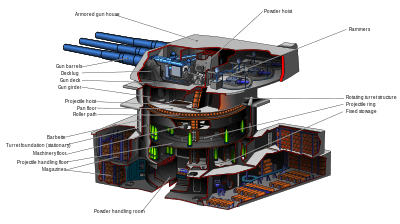Main battery

Generally used only in the terms of naval warfare, the main battery is the primary weapon around which a ship was designed. "Battery" is in itself a common term in the military science of artillery.
Description
The main battery included all turret guns in ships with gun turrets. Battleships and cruisers were designed around their main battery turrets, while smaller guns were mounted wherever convenient.
Turreted ships included a secondary battery originally intended for defense against torpedo boats.
In ships without turrets, the main battery included all guns except depth charge projectors and guns designed for use against aircraft. Guns designed for use against aircraft were referred to as the anti-aircraft battery.[1]
The terms main battery and secondary battery fell out of favor as ships were designed to carry surface-to-air missiles and anti-ship missiles with greater range and heavier warheads than their guns.[2] Such ships often referred to their remaining guns as simply the gun battery and to the missiles as the missile battery. Ships with more than one type of missile might refer to the batteries by the name of the missile. USS Chicago had a Talos battery and a Tartar battery.[3]
Examples
The German battleship Bismarck, carried a main battery of eight 15 inch (380mm) guns, along with a secondary battery of twelve 5.9 inch (150mm) guns for defense against destroyers and torpedo boats, and an anti-aircraft battery of various guns ranging in caliber from 4.1 inch (105mm) to 20mm guns.[4]

Many later ships during World War II used dual-purpose guns to combine the secondary battery and the heavier guns of the anti-aircraft battery for increased flexibility and economy. The United States Navy battleship USS Washington had a main battery of nine 16-inch (410 mm) guns arranged in three turrets, two forward and one aft. The secondary battery was 5-inch dual purpose guns, meaning they could be fired against other ships or used as an anti-aircraft weapon. There was also an anti-aircraft battery of Bofors 40 mm guns and Oerlikon 20 mm cannon.[5]
See also
References
Notes
- ↑ Fairfield, A.P. (1921). Naval Ordnance. Baltimore, Maryland: The Lord Baltimore Press. p. 157.
- ↑ Frieden, David R. (1985). Principles of Naval Weapons Systems. Annapolis, Maryland: Naval Institute Press. pp. 586–601. ISBN 0-87021-537-X.
- ↑ Albrecht, Gerhard (1969). Weyer's Warships of the World. Annapolis, Maryland: United States Naval Institute. p. 138.
- ↑ Taylor, J.C. (1966). German Warshps of World War II. Garden City, New York: Doubleday & Company. p. 13.
- ↑ Silverstone, Paul H. (1968). U.S. Warships of World War II. Garden City, New York: Doubleday & Company. p. 28.